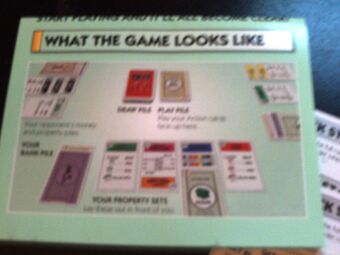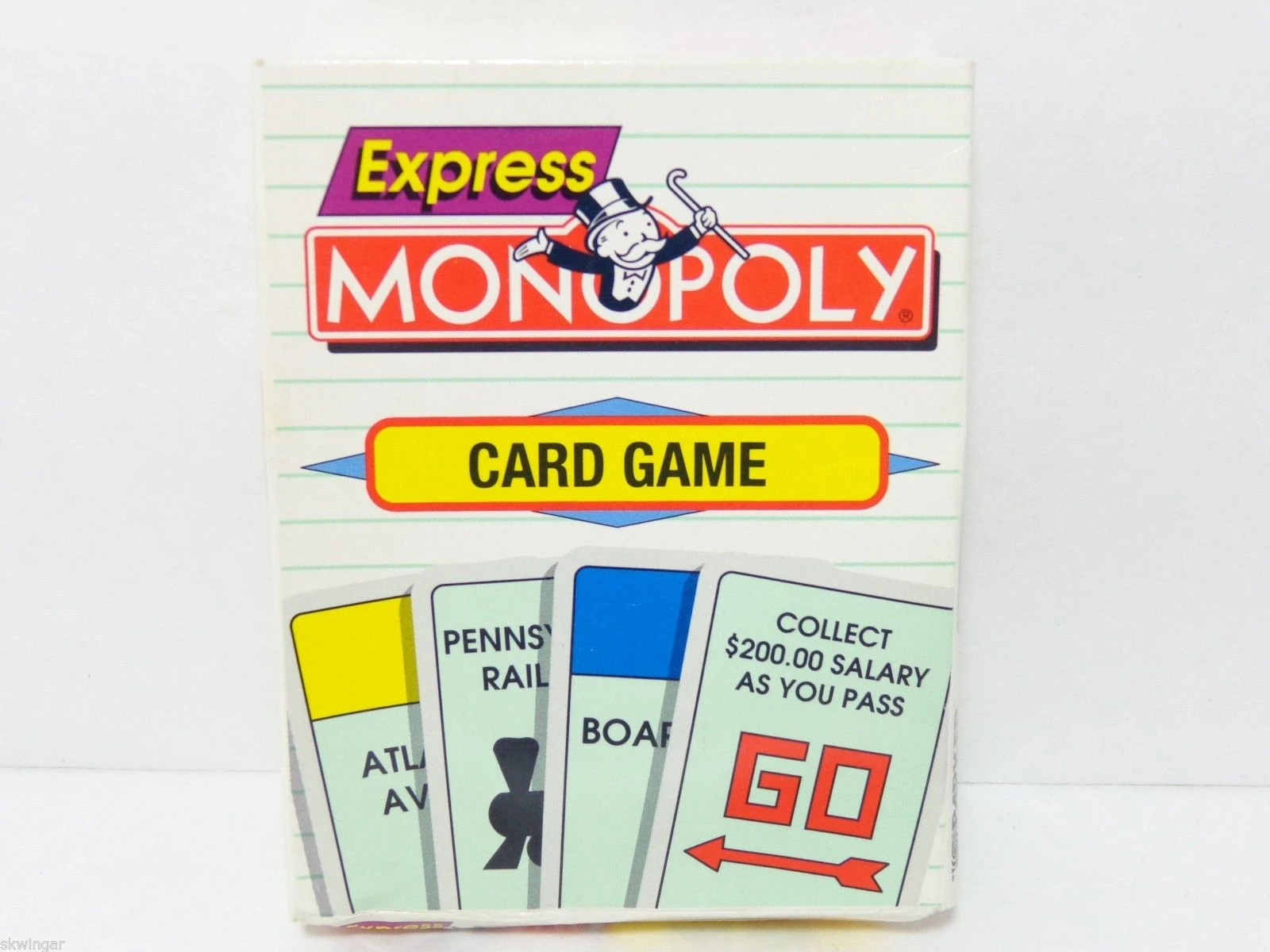Get a handy way to play the classic property-trading game! Be the first collect 3 full property sets of different colors, and you'll win the Monopoly deal card game. You'll pick up cards when it's your turn and play action cards to charge players rent, steal their cards or demand money for your birthday. Get ready for an exciting quick-playing Monopoly card game! The Monopoly Bid game is a game of chance, luck, and strategy as players bid in blind auctions, pay with money cards, steal properties with Action cards, and change their luck with Wild cards. Played in rounds, everyone gets a chance to host an auction.
Monopoly Card Game Rules


Use in the game[edit]
The U.S. version of the board game Monopoly has two Get Out of Jail Free cards, with distinctive artwork. One, a 'Community Chest' card, depicts a winged version of the game's mascot, Mr. Monopoly, in his tuxedo as he flies out of an open birdcage. The other, a 'Chance' card, shows him booted out of a prison cell in a striped convict uniform.
Players move around the Monopoly board according to dice throws. Most of the tiles players land on are properties that can be bought. There is also a tile, the Jail, that can hold players and cause them to lose their turn until certain conditions are met. They can end up in this space by landing on the 'Go to Jail' tile, throwing three doubles in a row, or drawing a 'Go to Jail' card from Community Chest or Chance. The Get Out of Jail Free card frees the player from jail to continue playing and progress around the board without paying a fee, then must be returned to the respective deck upon playing it.
As the card's text says, it can also be sold by the possessing player to another player for a price that is 'agreeable by both'. Due to the fact that in the early game, one typically has all the funds necessary to get out of jail normally, and in the late game, the player typically wants to stay in jail to avoid landing on the spaces of the other players, the cards are typically only used as a massive financial asset.
In law[edit]

A Get Out of Jail Free card is an element of the board game Monopoly which has become a popular metaphor for something that will get one out of an undesired situation.[1]
Use in the game[edit]
The U.S. version of the board game Monopoly has two Get Out of Jail Free cards, with distinctive artwork. One, a 'Community Chest' card, depicts a winged version of the game's mascot, Mr. Monopoly, in his tuxedo as he flies out of an open birdcage. The other, a 'Chance' card, shows him booted out of a prison cell in a striped convict uniform.
Players move around the Monopoly board according to dice throws. Most of the tiles players land on are properties that can be bought. There is also a tile, the Jail, that can hold players and cause them to lose their turn until certain conditions are met. They can end up in this space by landing on the 'Go to Jail' tile, throwing three doubles in a row, or drawing a 'Go to Jail' card from Community Chest or Chance. The Get Out of Jail Free card frees the player from jail to continue playing and progress around the board without paying a fee, then must be returned to the respective deck upon playing it.
As the card's text says, it can also be sold by the possessing player to another player for a price that is 'agreeable by both'. Due to the fact that in the early game, one typically has all the funds necessary to get out of jail normally, and in the late game, the player typically wants to stay in jail to avoid landing on the spaces of the other players, the cards are typically only used as a massive financial asset.
In law[edit]
- In 1567, the prize in Britain's first lottery, commissioned by Queen Elizabeth I and Sir Frances Drake to raise funds for England's navy, included a kind of 'get out of jail free card' which the winner could use to excuse any but the most serious crimes.[2]
- In 1967, James Robert Ringrose, one of the FBI's Ten Most Wanted Fugitives, presented a Get Out of Jail Free card to FBI agents after he was arrested.[3]
- In the U.S. Supreme Court case Hudson v. Michigan (2006), the Court ruled that use of evidence against a defendant obtained through search warrants in instances that the police failed to knock-and-announce does not violate the Fourth Amendment of the United States Constitution. The majority opinion by Justice Scalia notes that suppressing evidence in such instances would amount 'in many cases to a get-out-of-jail-free card.'[4]
- The Patrolmen's Benevolent Association of the City of New York, a large NYPD union, gives out cards to officers to distribute to friends and family, giving them preferential treatment for minor offenses. The cards are commonly referred to as 'get out of jail free' cards, and are sometimes sold on eBay.[5][6]
Monopoly Card Game Rules
See also[edit]
References[edit]
Monopoly Card Game Target
- ^Ritchie, L. David (2016). Metaphor. Cambridge University Press. p. 174. ISBN9781107022546.
- ^'The First National Lottery'. British Library. Archived from the original on 2016-01-21. Retrieved 7 December 2015.
- ^Dary Matera, FBI's Ten Most Wanted (NY, Harper Torch, 2003) page 43.
- ^Hudson v. Michigan (2006) 546 U.S. 586 at 595, 126 S.Ct. 2159 at 2166, 165 L.Ed.2d 56 at 67Archived 2017-09-21 at the Wayback Machine
- ^Kilgannon, Corey (11 January 2006). 'A Perk for Friends of the Police, Now on eBay'. New York Times. Archived from the original on 2018-01-31. Retrieved 2018-01-30.
- ^Balsamini, Dean (21 January 2018). 'Police union slashes number of 'get out of jail free cards' issued'. New York Post.

